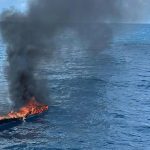Health and environmental issues glom largely over the fate of seafood. Mercury, PCBs, dioxin and other contaminants in our oceans, rivers and lakes have made their way into some fish and shellfish, reducing their value as healthy food choices. And many other fish populations have tanked due to over-fishing.
Due to this there is the option of buying organically farm-raised fish that are largely free of contaminants that may be found in their wild cousins. But some fish farming harms the ecology of our estuaries and impacts the habitats of native fish. The N.J. Departments of Environmental Protection and Health & Senior Services can help sort out the safety of the catch of the day with “Fish Smart, Eat Smart: A Guide to Health Advisories for Eating Fish and Crabs Caught in New Jersey Waters.”
The report is said to recommend a limit of no more than one meal of freshwater fish per week. It identifies high-risk individuals — infants, children, pregnant women, nursing mothers and women of childbearing age — and recommending a limit of one freshwater fish meal per month. It also provides guidelines for fish caught in specific bodies of water in New Jersey.
According to a study published in the journal Science in 2006 fish populations consumable by humans will have completely collapsed by 2050. The four-year study analyzed 32 controlled experiments, studies from 48 marine protected areas, and 53 years of global catch data from the U.N.








